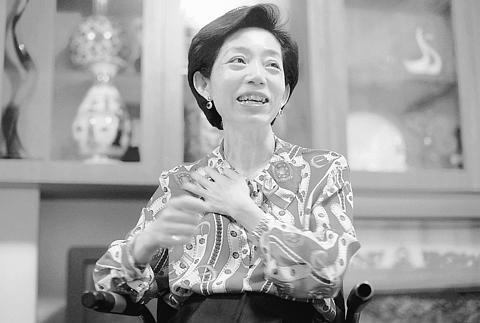Taiwan's future first lady doesn't worry about revealing her forthright character and her views when talking about her new role, that will begin when her husband is inaugurated this Saturday.
"We will be a first family that is closer to the people. We are young, and there can be many possibilities regarding our future roles," Wu Shu-chen
Wu said the so-called "official wife culture" during the KMT's period of rule in Taiwan would be cast aside.

PHOTO: CHEN CHENG-CHANG, TAIPEI TIMES
"What exactly is an official's wife? Is it a character who shows up during the election campaign for her husband? This is utter nonsense," Wu said.
Her feelings about moving to the presidential residence are similar. She says she couldn't care less about the interior decor of their new home, nor the first family's parties. She says she worries more about potential hassles between her two children and their security staff -- and if her dog will have a hard time getting used to the new toilet arrangements.
As the wife of Taiwan's youngest president, Wu said she has been through a "different" process as a public figure, compared with, say, US first lady Hilary Clinton.
"She began as first lady and is now running for senator. I was first a legislator and now am the first lady," said Wu. But, like Hilary Clinton, Wu says she will devote herself to promoting the welfare of minorities and the physically challenged. Taiwan society seems to have neglected such issues, Wu says. "There was very little media attention when our foundation held meetings on minority welfare." She is currently president of the Formosa Foundation, an institution that conducted polls, campaigning and social activities for Chen's past political involvements.
After the inauguration, she will no longer hold the post of president and the scale of the foundation will be downsized. But her efforts toward minority welfare will not be changed, Wu said.
In terms of showing respect and empowering the physically disadvantaged, she said: "We have less charity than foreign countries."
For an amicable and optimistic woman, as Wu certainly is, she says the last thing the physically disadvantaged need is pity. Fifteen years ago when she was discharged from hospital after being hit by a car that left her largely paralyzed -- an incident believed to have been deliberate -- Wu said she "strolled" around department stores in her wheelchair, holding her urinal bag.
"I didn't feel any shame, and I didn't care about people giving me strange looks," Wu says.
Which is part of the reason why, for Wu, shopping is always much more enjoyable than any social or political meeting, despite her sharp vision and knowledge of politics.
"I don't think I will be doing any so-called `wife diplomacy' for President Chen. If I travel, I'll go to any country I like," Wu said.

‘ABUSE OF POWER’: Lee Chun-yi allegedly used a Control Yuan vehicle to transport his dog to a pet grooming salon and take his wife to restaurants, media reports said Control Yuan Secretary-General Lee Chun-yi (李俊俋) resigned on Sunday night, admitting that he had misused a government vehicle, as reported by the media. Control Yuan Vice President Lee Hung-chun (李鴻鈞) yesterday apologized to the public over the issue. The watchdog body would follow up on similar accusations made by the Chinese Nationalist Party (KMT) and would investigate the alleged misuse of government vehicles by three other Control Yuan members: Su Li-chiung (蘇麗瓊), Lin Yu-jung (林郁容) and Wang Jung-chang (王榮璋), Lee Hung-chun said. Lee Chun-yi in a statement apologized for using a Control Yuan vehicle to transport his dog to a

Taiwan yesterday denied Chinese allegations that its military was behind a cyberattack on a technology company in Guangzhou, after city authorities issued warrants for 20 suspects. The Guangzhou Municipal Public Security Bureau earlier yesterday issued warrants for 20 people it identified as members of the Information, Communications and Electronic Force Command (ICEFCOM). The bureau alleged they were behind a May 20 cyberattack targeting the backend system of a self-service facility at the company. “ICEFCOM, under Taiwan’s ruling Democratic Progressive Party, directed the illegal attack,” the warrant says. The bureau placed a bounty of 10,000 yuan (US$1,392) on each of the 20 people named in

The High Court yesterday found a New Taipei City woman guilty of charges related to helping Beijing secure surrender agreements from military service members. Lee Huei-hsin (李慧馨) was sentenced to six years and eight months in prison for breaching the National Security Act (國家安全法), making illegal compacts with government employees and bribery, the court said. The verdict is final. Lee, the manager of a temple in the city’s Lujhou District (蘆洲), was accused of arranging for eight service members to make surrender pledges to the Chinese People’s Liberation Army in exchange for money, the court said. The pledges, which required them to provide identification

INDO-PACIFIC REGION: Royal Navy ships exercise the right of freedom of navigation, including in the Taiwan Strait and South China Sea, the UK’s Tony Radakin told a summit Freedom of navigation in the Indo-Pacific region is as important as it is in the English Channel, British Chief of the Defence Staff Admiral Tony Radakin said at a summit in Singapore on Saturday. The remark came as the British Royal Navy’s flagship aircraft carrier, the HMS Prince of Wales, is on an eight-month deployment to the Indo-Pacific region as head of an international carrier strike group. “Upholding the UN Convention on the Law of the Sea, and with it, the principles of the freedom of navigation, in this part of the world matters to us just as it matters in the